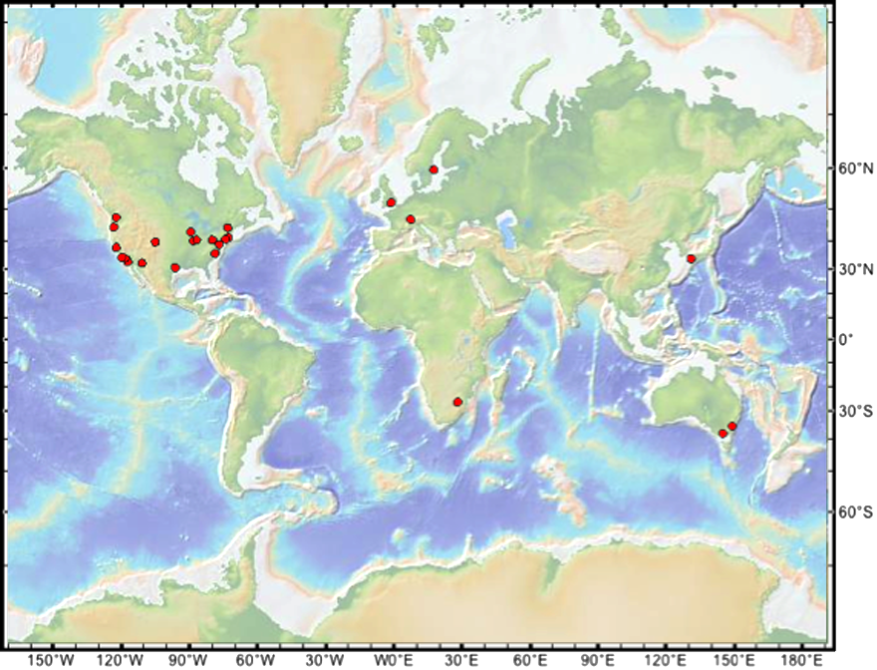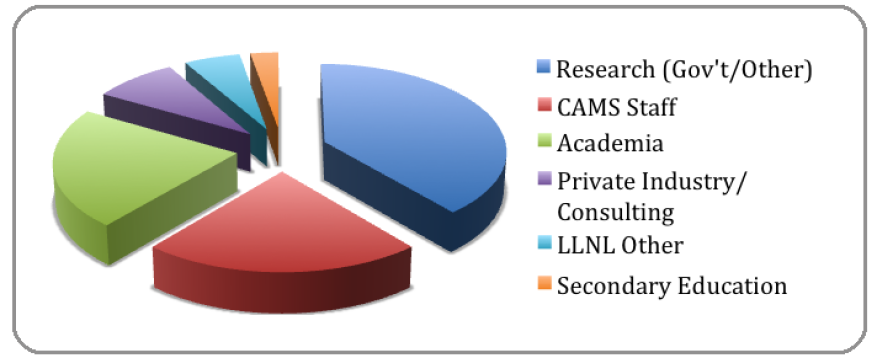CAMS provides a nexus for basic and applied research, and has a long tradition of being part of workforce development, training, and education. CAMS maximizes scientific impact by enabling university collaborations that leverage national security needs and strengthen related programs. We are highly collaborative and work with other groups and programs within LLNL as well as with the academic and research communities.
CAMS has hosted over 1000 faculty and student visitors resulting in over 300 PhD and Masters degrees over the past twenty-five years. Several former student visitors now have university faculty positions and 9 former CAMS Scientists lead or are principle scientists at other AMS centers. A wide spectrum of formal and informal mechanisms are used to develop interactions and engagement.
Undergraduate Students
At the undergraduate level, CAMS hosts summer interns through a variety of formal sponsored programs. These include but are not exclusive to DOE's SULI program, Minority Serving Institution, and LLNL's Seaborg Institute. Additionally, we often employ undergraduates in a variety of part-time and academic year technical positions. Undergraduate technicians tend to be from ‘local’ campuses such as UC Berkeley, Cal-State Hayward, San Jose State University, and Mills College. We have had undergraduates from UC Santa Barbara, UC Davis, and UC Santa Cruz who work on their senior thesis projects while in residence at CAMS.
Teachers
Since 2007, CAMS has participated in the Teacher Research Academy and the STAR program. Both programs are part of the Science Education Program within the Edward Teller Education Center. The TRA and STAR intern programs provide STEM teachers, and students in credential programs professional development instruction and research opportunities.
Graduate Students
CAMS has facilitated a very large number of diverse graduate student research (MS, PhD) projects. Historically, we have had an open door policy to hosting graduate student researchers to train them in sample preparation, data acquisition, accelerator technology, instrumentation, and experimental design. Often these opportunities are ad-hoc and rely on the graduate student's advisor having a past relationship with CAMS or with current CAMS staff. Formal support of graduate student researchers includes collaborative extramurally funded research and LLNL's Livermore Graduate Scholar Program.
Post-doctoral Researchers
CAMS has had and continues to have a significant impact via post-doctoral researchers. Historically, we have two or more post-doctoral researchers in residence at any one time. Although there is often overlap between research activities and interests, post-doctoral researchers are administratively assigned to one or more of the research themed groups: Natural Carbon, Biomedicine, Earth Sciences, Actinides, Nuclear Physics, and Materials Science. In addition to CAMS’ post-docs we also host post-doctoral researchers from within LLNL, other academic institutions and agencies (e.g., the United States Forestry Service (USFS)) so that they can have direct and unfettered access to CAMS' analytical facilities. CAMS staff actively mentor a non-LLNL post-doctoral researcher while in residence and there is a formal collaboration between the supervising CAMS staff scientist and the external mentor/sponsor.
CAMS attracts post-doctoral researchers from around the world (Figure 1) and from within a wide range of disciplines. The majority of these post-doctoral researchers find future positions in research and academia (Figure 2) with an appreciable fraction finding positions within LLNL.
Sabbatical Programs
Academic faculty who wish to spend time at CAMS while on a sabbatical should contact the most appropriate CAMS staff scientist within their appropriate discipline. General inquiries should be sent to the CAMS administrator (sorensen5 [at] llnl.gov (Nanette Sorensen)) or to the Director of CAMS (tumey2 [at] llnl.gov (Scott Tumey)).






